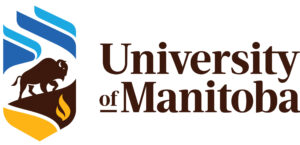
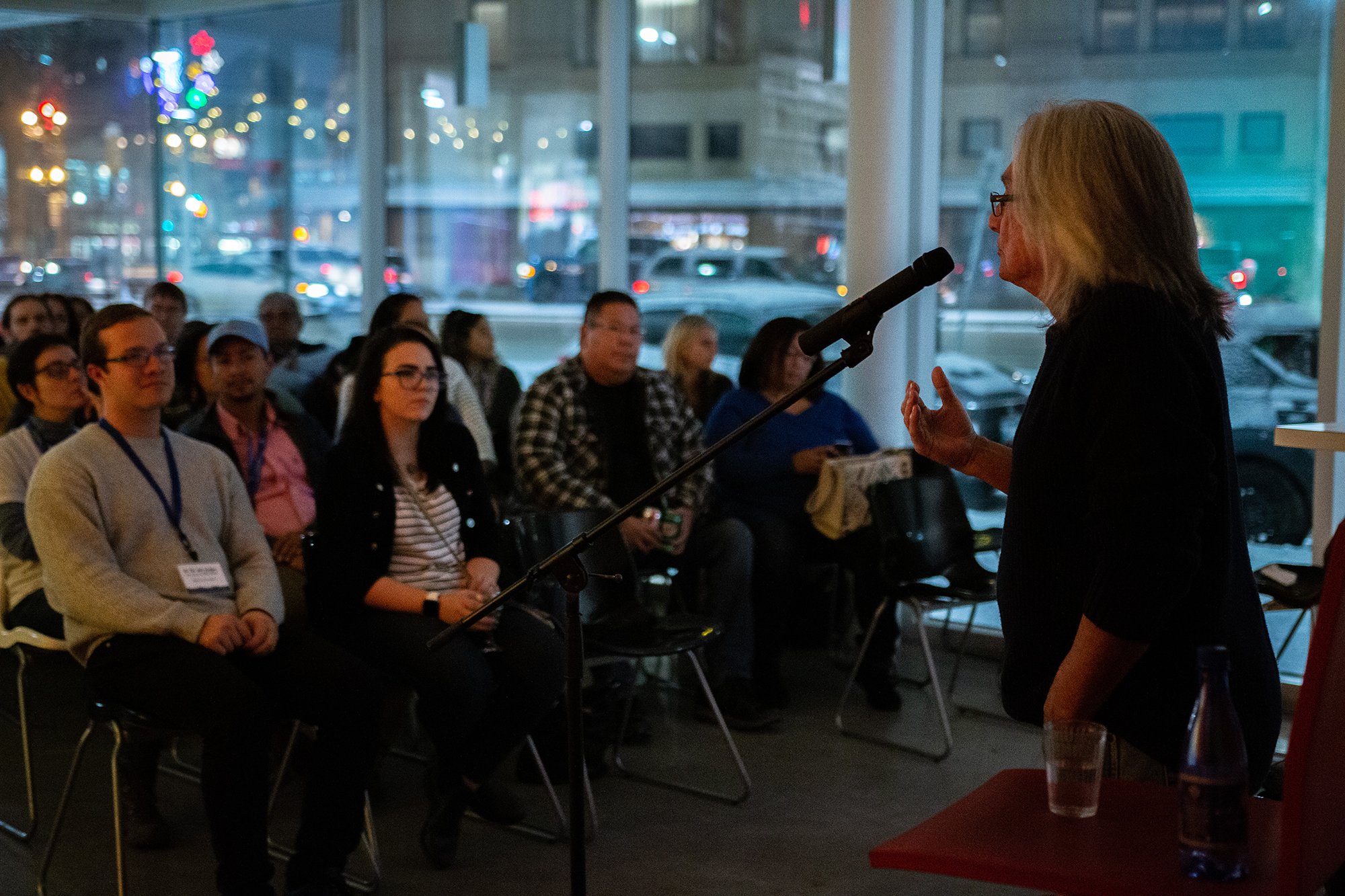 The 2019 Ki Ta Ski Naw Conference was held from the 8th to 10th of November in downtown Winnipeg on the University of Winnipeg. It brought together participants from Manitoba, B.C, Newfoundland and Labrador, the USA, Mexico, Latin America, as well as India, to discuss social, environmental and economic hydro-development impacts and solutions. Ki Ta Ski Naw means Our Land in Cree and the theme for this year was ‘Reflecting and Acting on Hydropower and Energy Justice.’
The 2019 Ki Ta Ski Naw Conference was held from the 8th to 10th of November in downtown Winnipeg on the University of Winnipeg. It brought together participants from Manitoba, B.C, Newfoundland and Labrador, the USA, Mexico, Latin America, as well as India, to discuss social, environmental and economic hydro-development impacts and solutions. Ki Ta Ski Naw means Our Land in Cree and the theme for this year was ‘Reflecting and Acting on Hydropower and Energy Justice.’The days started early with plenary sessions and keynote speakers in the morning, a lunch break and breakout sessions in the afternoon. The conference started in a good way with a pipe ceremony as in Convocation Hall on the first morning. Many took the time to attend this earlier session and for quite a few it was their first cultural experience in Canada, an opportunity that they appreciated.
The morning plenary sessions brought together all participants of the conference in one space to learn about various topics. Site C through Keeyask to Muskrat Falls talked about the larger Canadian struggle in opposition of mega dams that are to be or have been built by Hydro Quebec, BC Hydro, and Manitoba Hydro. International Resistance to Hydro Development was held in both Spanish and English and discussed the startling similarities of hydro impacts within Indigenous communities in Panama and throughout South America. The role that Canadian multi-nationals play in inflicting these impacts was also highlighted, as was the resistance by people to this so called development. Different ways of Taking Action on Hydro Development tackled the positive end of the resistance, showing that when and where people work together, the seemingly impossible can be achieved.
The keynote speakers over the four days were Winona LaDuke, Tshaukuesh Elizabeth Penashue, Deepa Joshi and Senator Mary Jane McCallum. All the speakers were women of colour from communities impacted by hydropower and/or energy extraction. From Joshi’s research accounts, LaDuke and Penashue’s advocacy work, to Senator McCallum’s government work, all four women had very different yet complementary contributions to the larger story of Indigenous resistance to resource extraction. Look out for some of these presentations, which will soon be available online through our e-newsletter and on our website.
The breakout sessions took place in smaller settings to facilitate meaningful discussions around specific topics. From discussions of gendered impacts to GIS mapping and even to art and storytelling, there were many interesting workshops. Hard decisions had to be made when deciding which workshops to attend!
After long days, the evenings were a time for people to get to know each other in a less formal setting. On the first evening, breath-taking stories were shared by Cree Poet & Storyteller, Duncan Mercredi about life and about culture. The silence at the end of the stories showed just how immersed in the stories the listeners were, it was also an opportunity to think deeply about one’s own life. The next night there was a round dance with the Chitek Lake Singers from Saskatchewan on campus much to the delight of many. There were lots of giveaways but the experience of dancing, laughter and happiness around the room was the biggest take home. Many relationships were built during these evening as people had conversations about anything and everything. It was a delight to watch complete strangers relate so closely, as they realized that indeed they were all working towards the same goal.
The last day of the conference was an opportunity to head outside and be part of a movement. Many people had been making signs over the past few days and it was our chance to use them. The signs showed the impacts of mega dam development on the fish, homes, waterways, and larger environment. A long blue piece of cloth was also brought along to signify the rivers affected by hydro dams. We bundled up and headed into the snowy day determined to make it known that, Hydro Power is Not Green Power! It was a sight to behold as old, young, local, international, northerners and city folk all marched in solidarity to the Manitoba Hydro Courtyard. We delivered an invoice to them that showed all the costs of hydropower, the total cost of the invoice was “Incalculable”.
The impacts of mega-dams cannot truly be undone. The destruction of waterways, decline in fish populations, destruction of trap lines, increase of toxins in country food, destruction of burial sites, gendered-based violence, flooding, displacement of people and animals, breach of contracts and licences, loss of culture, loss of lives, and Methyl Mercury poisoning is truly hard to calculate. If all these impacts were, they definitely would not be worth the revenue generated from these dams.
This conference was a chance for people in the same struggle locally and globally to meet, a chance to see just how similar the impacts of hydro development are across borders, a chance to unite around a common cause, and that was a success!
Wa Ni Ska Tan: An Alliance of Hydro Impacted Communities
Attending Conferences or Rallies for a cause that is important to you often leaves you feeling inspired and ready to take action. With gathered new resources and connections, you might be feeling like you want to continue this work in your own community. Figuring where to start or how to begin can often seem intimidating. This package is meant to make it easier to begin channeling your energy into a cause, and provide you with some tools and ideas to get you started.
Jonathan Ventura – Freelance Journalist
Journalism has the power to hold leaders accountable for their actions, but how can community members ensure journalism is exercising its true potential? This workshop will explore: how journalism and newsrooms work; how to control your story in order to effectively communicate; what makes reporting in Indigenous communities unique; and hands-on tips for pitching and writing your own article. This workshop will leave community members better prepared for when a journalist calls or when you feel ready to write your own story.
Julio Lucchesi Moraes – Université de Saint-Boniface
In his presentation Julio Lucchesi visually presents a partial report on resource revenue sharing, innovative finance and economic reconciliation in hydro-affected Indigenous Communities in Manitoba using examples of existing and planned dams in Canada to discuss the employment achievements/ prospects, business opportunities and profit-sharing included for First Nations, Métis and Inuit communities in these agreements.
Movimento dos Atingidos por Barragens (MAB)
We face a new crime where, once again, thousands of people were affected and hundreds of people lost their lives. In Brumadinho, Minas Gerais, the collapse of Vale’s tailings dam devastated nature, and one month after, it is still not possible to fully measure its impact. Three years after the collapse of the Fundão tailings dam in Mariana, also in located Minas Gerais, Vale who is yet unpunished does not hesitate in causing new crimes. Vale is, therefore, recidivist and responsible for another social, environmental and economic tragedy. Th is document aims at denouncing Vale’s crime through the lens of workers. We, people affected by dams who suffer the continuous violation of our rights, denounce the destruction and appropriation of natural goods, the exploitation of workers and the disrespect for communities by companies for the purpose of generating extraordinary profits.
Anna Millest – Executive Assistant under Senator McCallum
In her plenary presentation Anna Millest speaks about her experience throughout the conference especially regarding gendered impacts of hydroelectric development, exploring what gender-based analysis is and how it can be applied to natural resource development projects. Anna also looks into environmental justice issues surrounding the socio-economic impacts employment, housing, education and training, health, social services and infrastructure, substance use, sex work and exploitation, violence, food security, and culture and traditions. She prposes moving forward by including Gender-Based Analysis in Environmental Assessment processes and in all government policies, programs, and initiatives.
James Campbell – Director of Parliamentary Affairs under Senator McCallum
In his plenary presentation, James Campell speaks about how he got involved in his work, the Impact Assessment Bill, it’s hearing process and its implications to communities in the prairies. James also speaks about making space for and giving a voice to Indigenous people and the environment surrounding the scope of resource extraction. He goes into the gendered impacts of Kettle, Long Spruce and Limestone mega-dams as a result of man-camps; the sexual violence and empowerment of women after violation of women’s rights.
Byron Williams, Patricia Fitzpatrick and Heather Fast – The Public Interest Law Centre (PILC), University of Winnipeg, Natural Resources Institute (NRI)
Over the last 45 years, hydroelectric development on the Churchill-Burntwood- Nelson system has had devastating and irreparable consequences on the North. The serial nature of the development agenda contributed to a patchwork system of environmental and waterpower licenses, involving an array of community agreements, monitoring arrangements and oft-extended interim licensing provisions. Access to a robust, publicly available historic documentation is fragmented, leading to an incomplete record of community initiative, as well as the corporate narrative. An important feature of the Water Power licensing system in the province is the inclusion of expiration dates. The purpose of this session is to initiate dialogue amongst potential intervenors in re-licensingapplications.
Jared Wheeler – Jerch Law
Jerch Law set out to research and provide a legal opinion with respect to the broad topic of “Aboriginal Rights to water in Canadian law, through a number of “legal tests” and different methods for potentially asserting and protecting Indigenous water Rights. They provided a legal opinion and memorandum that could perhaps provide a template for communities to utilize for assessing the likelihood of success for their own claims based on the assertion of an Aboriginal and/or Treaty Right to water. This paper is a condensed version of that 65-page research memorandum/legal opinion.
Carl Wassilie Angut’aq – Yupik Biologist
In his presentation, Yupik Biologist, Carl Wassilie Angut’aq explores notions of respect for water, as a living being. He draws on Indigenous perspectives to undercover the importance of water, and shares stories of energy and ecological justice for water. Carl is a member of the Alaska Inter-Tribal Council and Alaska’s Big Village Network.
Essays on Hydropower and Climate Change issues of Sikkim
Edited by Tshering Eden and Pema Wangchuk
The eight essays featured in this book were first published as part of the “Spotlight” series in Gangtok-based English daily, SummitTimes, in April-May 2018. The series was an attempt to highlight issues surrounding hydel projects and climate change in and around Sikkim. While ‘environment’ is often part of discussions in Sikkim at various levels, deeper investigations into what is happening on ground remain sparse. The series, therefore, hoped to draw attention towards the need for such enquiries and to underline their importance in understanding the impact of climate change and the environmental concerns of developing hydropower projects. The essays cover the beginnings of hydropower generation in Sikkim to climate change impacts on ground, stories we hope can add to and explain the already existing knowledge on these subjects.
Activists’ Stories Of Resisting Hydropower Projects
CCMCC-NWO project, “Hydropower development in the context of climate change: Exploring conflicts and fostering cooperation across scales and boundaries in the Eastern Himalayas
This book presents the stories of six hydropower related movements in the Eastern Himalayas. Two of the authors are from Nepal, while the others live in various states in the North Eastern region of India. The conflicts these actors are part of and describe here, are at various stages in their life cycles with the Ithai barrage in Manipur being operational for decades to the West Seti hydropower project being stalled at the land requisition stage, now for two decades since the first MoU was signed between the Government of Nepal and West Seti Hydropower Limited. The means of protest range from hunger strikes in the Teesta basin to impounding turbines in Subansiri. One very effective way in which the protesters prevented work progressing on the Lower Subansiri Dam was by preventing the passage of construction material to the site. At one point, they impounded the trucks carrying turbines and so stalled work. All this diversity is reflected in the chapters that the authors have drafted.
The opening plenary session for the 2019 Ki Ta Ski Naw: Our Land Conference took place on Friday, November 8th, at the University of Winnipeg
Panel: Site C through Keeyask to Muskrat Falls
Moderator: Sarah Cox, Investigative Journalist and Author
Robert Spence, Tataskweyak Cree Nation
Denise Cole, Labrador Land Protectors
Connie Greyeyes, Fort Frances, BC
This spring, Senator Mary Jane McCallum put forth a request for a special investigation into the Office of the Auditor General of Canada to examine the cumulative adverse impacts of resource extraction and development in Canada. We were honoured to have Senator McCallum along with her colleagues James Campbell and Anna Millest participate in the conference. They shared insight into their experience throughout the conference, as well as the importance of their request for a special investigation, in their presentation on the final day of the conference. They highlighted the various challenges they learned about from those in attendance experiencing the first hand impacts of hydro development, and reminded us that by working together, we can make way for a brighter future.
View The Honourable Senator Mary Jane McCallum’s Presentation
University of Winnipeg, Winnipeg, Manitoba
Original lands of Anishinaabeg, Cree, Oji-Cree, Dakota, and Dene peoples, and on the homeland of the Métis Nation
November 8th, 9th & 10th, 2019
– Pipe Ceremony 7:00am – 7:30am –
Convocation Hall
– Registration 7:00am – 5:00pm –
Entrance of Riddell Hall
– Breakfast 8:00am –
Riddell Hall
Convocation Hall Plenary
9:00 am – 10:00 am
Opening Ceremony and Welcome
10:00 am – 11:00 am
From Site C through Keeyask to Muskrat Falls
11:30 am – 12:30 pm
Keynote presentation by Winona LaDuke, Honor the Earth
– Lunch 12:30 pm to 1:30 pm –
Riddell Hall
1:30 pm – 3:00 pm
Breakout Sessions
#1 Mapping Conflicts and Resistances Around Hydropower Projects
#2 Lake Stories: From Granville to Winnipeg
#3 Writing Your Own Story: Journalism for Community Members
#4 Up the Nelson River – The Fraught Relationship between York Factory First Nation and Hydro in Our Ininew Territory
#5 Community/Hydro Partnerships: Exploring the Aboriginal Rights to Water and Benefit-Sharing
#6 Film Session: Voices of Teesta
3:30 pm – 5:00 pm
Breakout Sessions
#1 Preparing for the Next Generation of Hydroelectric Licensing
#2 My Story is a Shared Story, Building the Circle of Protector
#3 Activist Movements of Latin America: Dam Resistance
#4 The Use of Geographic Information Systems (GIS) Platforms in Mapping Indigenous Traditional Knowledge
#5 Traditional Knowledge & Understanding Hydro Impacts
#6 Film Session: Documenting Hydro Impacts in Northern Manitoba
Plug In Gallery
Featuring Cree Poet & Storyteller, Duncan Mercredi
– Registration 7:00am – 5:00pm –
Entrance of Riddell Hall
– Breakfast 8:00am –
Riddell Hall
Riddell Hall Plenary
9:00 am – 10:00 am
Opening Song, Youth Statement, & Friday Reflection
10:00 am – 11:00 am
Keynote Presentation by Deepa Joshi, Honorary Research Fellow, Coventry University
“Like Water for Justice”
11:30 am – 12:30 pm
International Resistance to Hydro Development
– Lunch 12:30 pm to 1:30 pm –
Riddell Hall
1:30 pm – 3:00 pm
Breakout Sessions
#1 Dam(n)ing Manitoba’s North
#2 Our Voices Together in Trauma & Resilience: Sharing Stories of Gendered Violence of Resource Development
#3 Tracking Change: Local and Traditional Knowledge in Watershed Governance
#4 Photo Voice for Community-Based Research and Activism
#5 Global Activism and Resistance
#6 Film Session: Indigenous Perspectives on Climate Change & Resistance Activism
3:30 pm – 5:00 pm
Breakout Sessions
#1 Megadams = Megadamage: Building US/Canadian Alliances Centred on Grassroots Resistance
#2 Building Water Governance: Treaty #3 Anishinaabeg and the Journey Toward the Nibi (Water) Declaratio
#3 Cultural Camps as a Path to Healing
#4 Voicing from Within: Cultivating a Collaborative Arts Curriculum
#5 Powered Up: Resistance, Decolonization, and Energy Justice
#6 Film Session: An Analysis of Hydro Development in South Indian Lake: Oral History, Licensing, and Aboriginal Rights
Riddell Hall, University of Winnipeg
Doors Open 6pm, Dinner Served at 6:30pm
Keynote Presentation by Tshaukuesh Elizabeth Penashue
Round Dance with the Chitek Lake Singers
– Breakfast 8:00am –
Riddell Hall
Riddell Hall Plenary
9:00 am – 10:00 am
Keynote Presentation by Senator Mary Jane McCallum
10:00 am – 11:00 am
Bringing it All Together
11:30 am – 12:30 pm
Taking Action in Solidarity
– Lunch 12:30 pm to 1:30 pm –
Riddell Hall
1:30 pm – 2:00 pm
Conference Closing Ceremony
Riddell Hall
March & Rally
TBA
Conference Program Subject to Change
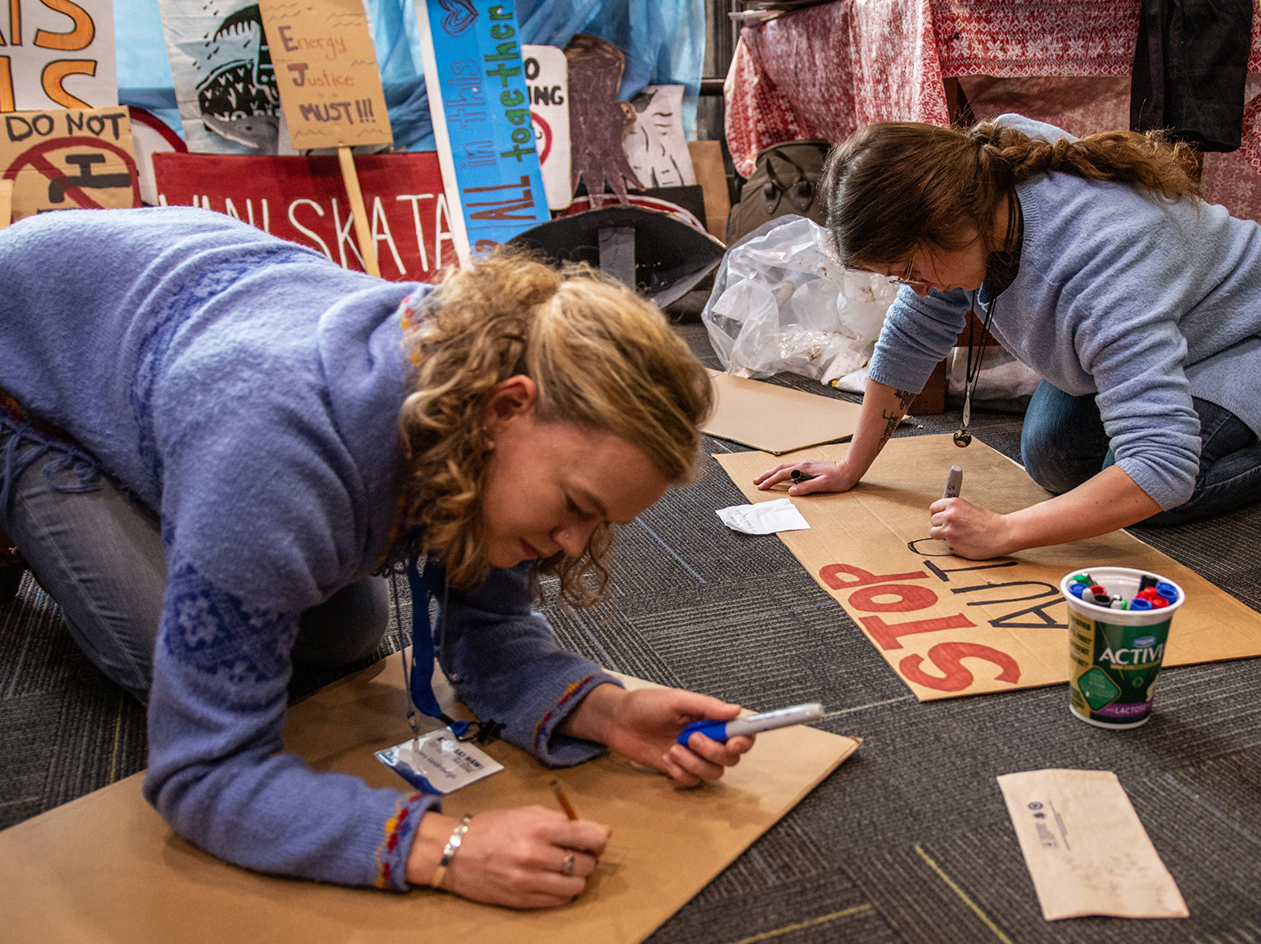
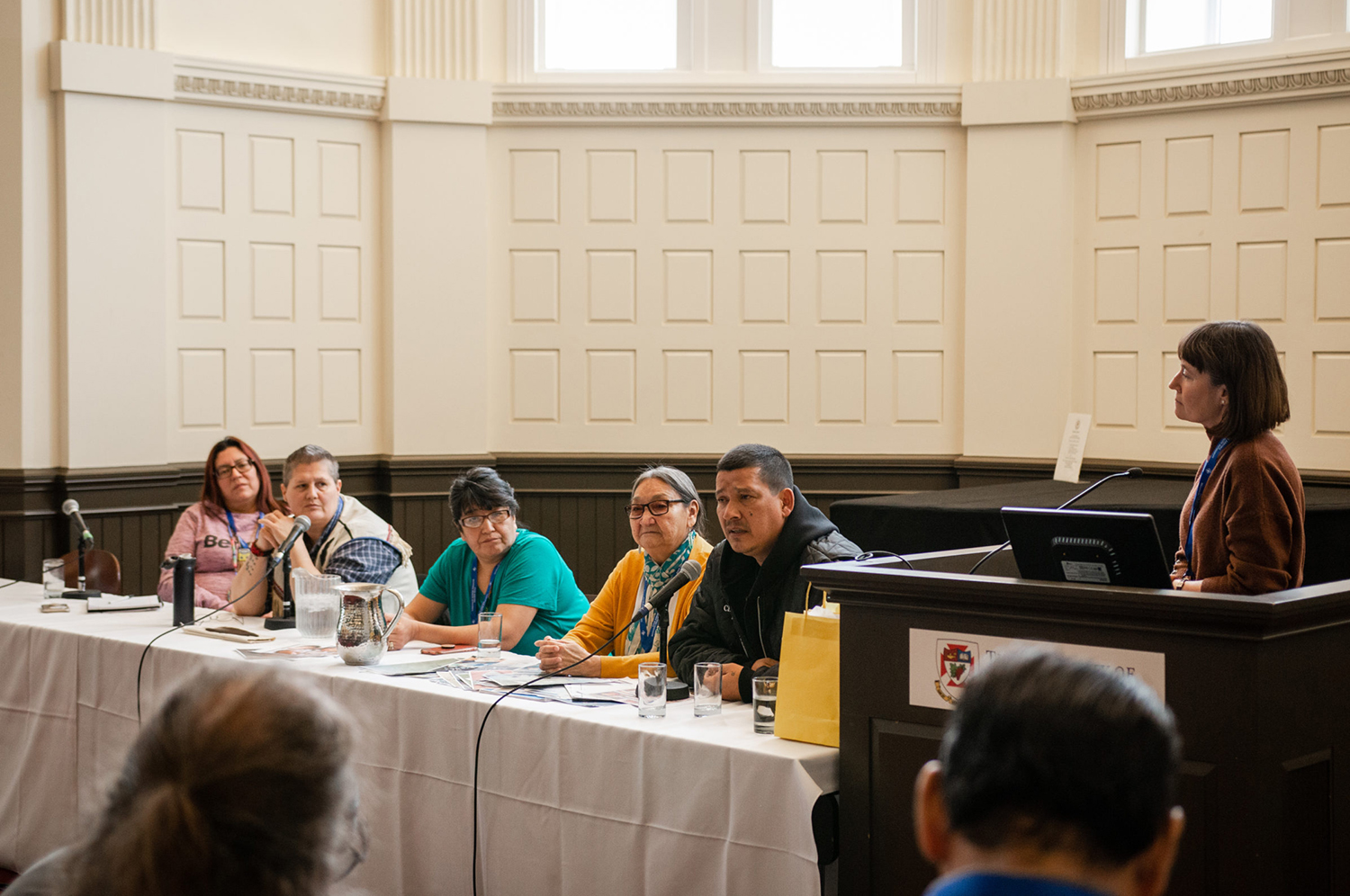
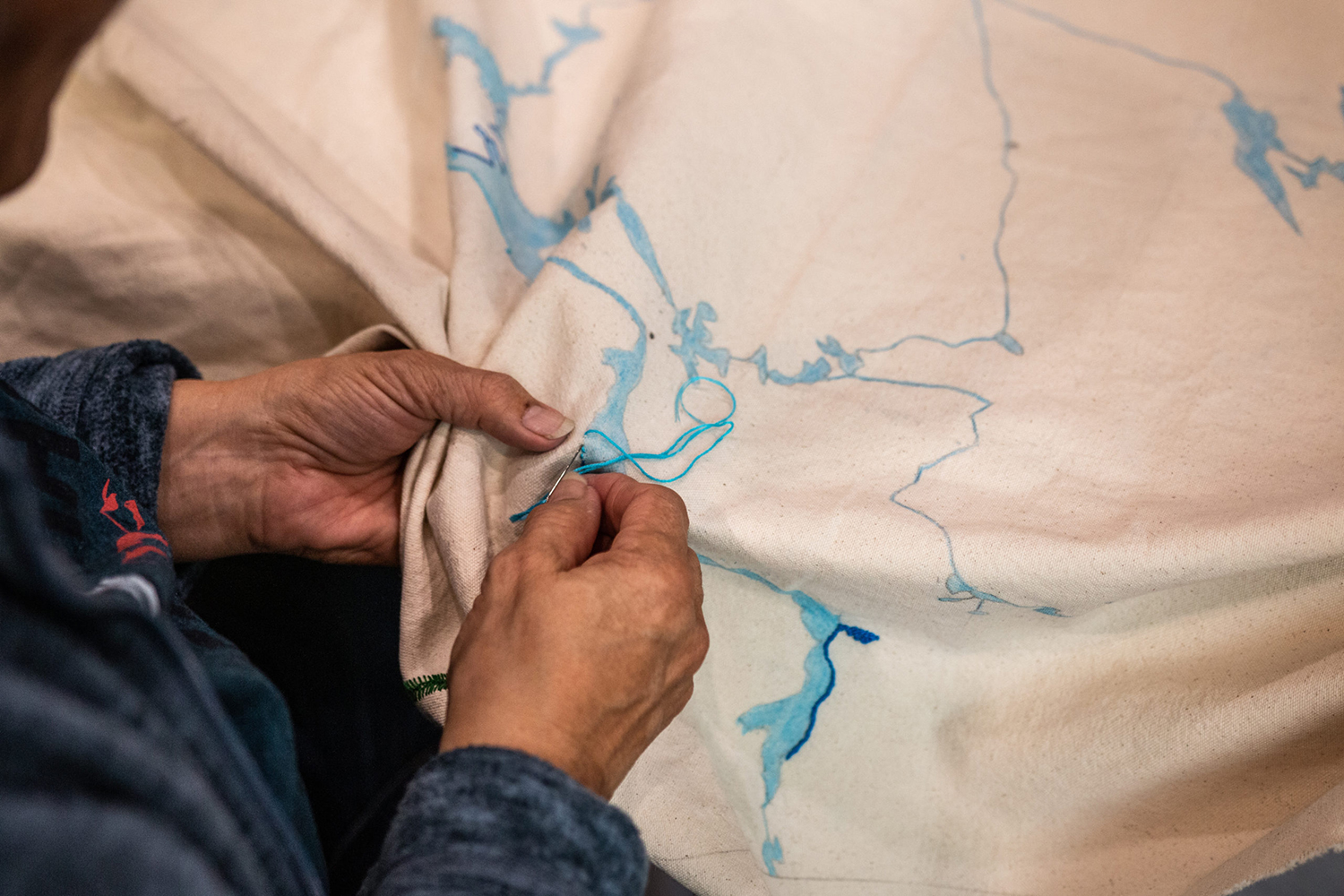
We would like thank our wonderful sponsors and partners who have helped make the 2019 Ki Ta Ski Naw Conference and Gathering possible.
